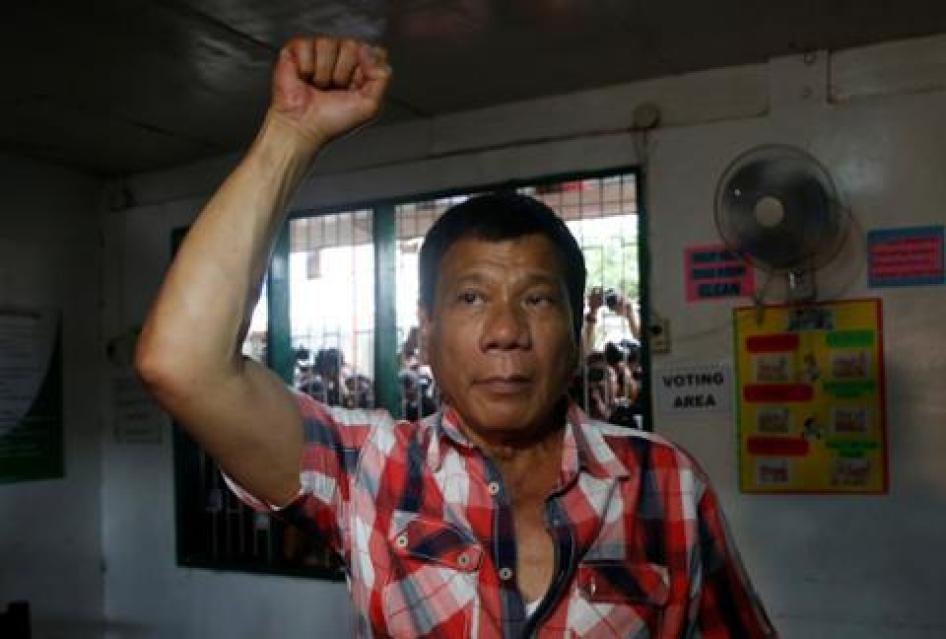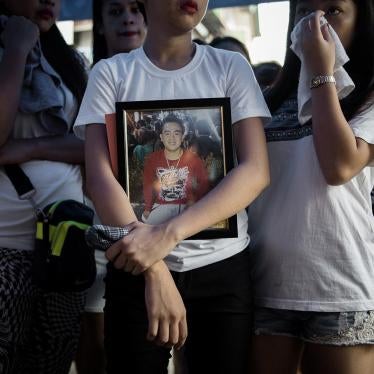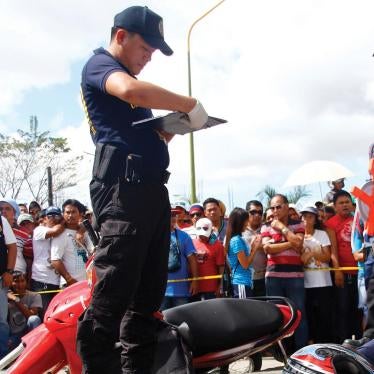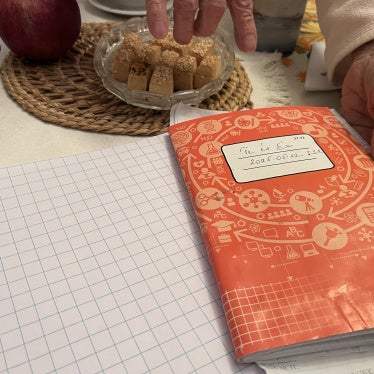In May 2015, Rodrigo Duterte invited my colleagues and I for some rest and relaxation in Davao City, the metropolis in the south of the Philippines that he has overseen as mayor for almost 30 years. “To all the bleeding hearts of U.S.-based [Human Rights] Watch,” Duterte wrote in a statement. “You want a taste of justice, my style? Come to Davao City, Philippines, and do drugs in my city. I will execute you in public.”
That threat was in response to the Human Rights Watch (HRW) criticism of Duterte’s public support for the gangland-style killings as a form of crime control. A 2009 HRW report investigated the cases of some of the hundreds of people — including children as young as 14 — murdered by death squads in Davao City and other cities in the Philippines. Though there is no hard evidence of Duterte’s direct role in ordering the killings, we found proof that Davao City officials and police were directly involved. (And Duterte himself has never shied away from publicly applauding the targeted killing of what he calls “criminals.”)
Duterte’s response to HRW was no one-off, career-ending, slip-of-the-tongue. Rather it embodies the key elements of his political rhetoric, which lumps together crime and universal human rights (and their advocates) as twin toxic threats to Philippine society. The 71-year-old Duterte delivers that message in crude, hyper-aggressive language that’s as lurid as it’s unrepentant. “Forget the laws on human rights,” Duterte told a rapturous crowd of more than 300,000 people on the eve of the May 9 presidential elections, which Duterte won in a landslide, with an estimated nearly 40 percent of the vote. “If I make it to the presidential palace,” he said, “I will do just what I did as mayor. You drug pushers, holdup men, and do-nothings, you better get out because I’ll kill you.” Duterte’s successful presidential campaign against four other candidates was built on espousing political positions that are as disturbing as they are unlawful. He has managed to convince a plurality of the Philippine electorate that he “will solve drugs, criminality, and corruption in three to six months” — by whatever means necessary.
For its report, HRW interviewed death squad insiders — relatives and friends of death squad members with direct knowledge of operations — as well as journalists, community activists, and government officials who provided detailed corroborating evidence of the death squad’s operations. Most of the triggermen were either former communist insurgents who surrendered to the government, or individuals who joined the death squads to avoid being targeted by the group. Their handlers, called amo (boss), were usually police officers or ex-police officers who provided the gunmen with training, weapons and ammunition, motorcycles, and information on the targets. (Death squad members often carried .45-caliber handguns, a weapon commonly used by the police but normally prohibitively expensive for gang members and common criminals.) After the killings, police stations were tipped off, ensuring that officers would respond slowly, and enabling the death-squad members to escape the crime scene.
Duterte has done little to distance himself from allegations of involvement in the death squads. In May 2015, he publicly admitted his active complicity: “Am I the death squad? True. That is true,” he said, only to retract his admission days later. Over the past few decades, he has made numerous statements attempting to justify killing suspected criminals. In 2001-2002, Duterte would announce the names of “criminals” on local television and radio; some of those he named would become victims of the death squads. Philippine authorities have yet to successfully prosecute anyone for any of these murders. Meanwhile, the killings continue, and copycat death-squad operations have emerged in other Philippine cities.
Duterte’s electoral victory will obligate him, after he takes office in June, to extend the human rights protections embodied in the constitution to all the people of the Philippines — even those he considers “criminals.” The departing Benigno Aquino administration failed to address impunity for the government’s rights violations. The combination of a lack of political will to investigate and prosecute abuses by state security forces; a corrupt and politicized criminal justice system; and a legacy of “patronage politics” — whereby wealthy individuals and private companies help finance political campaigns with the expectation of favors — has harmed the rights of many Filipinos. These problems now fall to the Duterte administration to tackle.
But Duterte’s statements both before and during the presidential election have raised grave concerns that his administration will result in a serious regression of human rights. In past speeches, Duterte has described his murderous tactics as a key plank of what he insists has been an effective governance strategy. “What I want to do is instill fear,” he told reporters in February 2009. “If you are doing an illegal activity in my city, if you are a criminal or part of a syndicate that preys on the innocent people of the city, for as long as I am the mayor, you are a legitimate target of assassination.”
He extended that strategy to his presidential campaign platform on a near-biblical scale, promising the mass killings of tens of thousands of “criminals,” whose bodies he would dump in Manila Bay.
Hopefully, that pledge was mere electioneering bombast.










